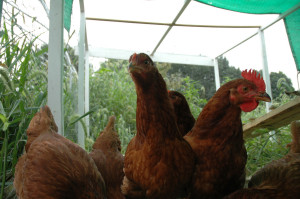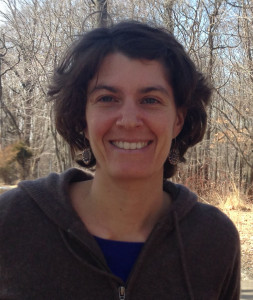By Daphne Churchill, Intern and Educator
 A bright sunny Saturday draws you out for a morning walk. You look up the street and see the white tents with tables of fresh products: red radishes, leafy green lettuce, freshly cut flower bouquets, free-range eggs, fresh goat cheeses, liquid amber honeys. The tables are bountiful and the tents abundant. Neighbors chat with one another as they nibble free samples and discuss their purchases. You overhear growers converse about sustainable practices and their business with the consumers as they debate and make their purchases. This typical scene of a farmer’s market has become ever more common in Philadelphia during the last decade. The local economy has seen an increase in the number of farmer’s markets and a diversification of what’s being sold. Local goods are no longer coming only from Lancaster but from Philadelphia’s own neighborhoods. City dwellers are increasingly advocating for the use of green space for gardening and are collaborating with a growing number of organizations for food, environmental, and health education initiatives supporting local food culture.
A bright sunny Saturday draws you out for a morning walk. You look up the street and see the white tents with tables of fresh products: red radishes, leafy green lettuce, freshly cut flower bouquets, free-range eggs, fresh goat cheeses, liquid amber honeys. The tables are bountiful and the tents abundant. Neighbors chat with one another as they nibble free samples and discuss their purchases. You overhear growers converse about sustainable practices and their business with the consumers as they debate and make their purchases. This typical scene of a farmer’s market has become ever more common in Philadelphia during the last decade. The local economy has seen an increase in the number of farmer’s markets and a diversification of what’s being sold. Local goods are no longer coming only from Lancaster but from Philadelphia’s own neighborhoods. City dwellers are increasingly advocating for the use of green space for gardening and are collaborating with a growing number of organizations for food, environmental, and health education initiatives supporting local food culture.
So what is it about local food culture that attracts so many people? What exactly does it mean for a city like Philadelphia to be described as having a great local food culture? Is local food viable for long-term sustainability, not just for some but for everyone? How does growing and buying food locally change one’s relationship with food and with one’s social and economic community? What are the benefits of growing and buying local foods?
Join us May 8 for Food for Thought: La vida local, to hear more about all these questions. The event, a collaboration between the Schuylkill Center and Weavers Way Coop, will pair a panel discussion with local refreshments and wine, all in the beautiful evening forest. Panelists, Aliza Green, Anna Herman, Emily Teel, and Kate Thomas will explore what local food culture looks like and what it means to build a place-based food culture.
The Schuylkill Center has long had a commitment to local food. There are over 4oo plots in the Organic Community Gardens and several farms growing food right at the Center. In addition to the space provided to support local food production, Down on the Farm Camp takes children to farms and engages them in learning about our food system.
The Weavers Way Cooperative has been a leader in the Philadelphia local food culture since 1973. They understand the power that providing good, clean, fair food can have to build strong, healthy, sustainable communities. During the past 41 years, Weavers Way has expanded their business model, truly dedicated to the idea that healthy living and food knowledge is for everyone. In addition, their Weavers Way Community Programs initiative has engaged children, teens, and adults in myriad aspects of food production and food culture.
But why food culture?
Food is central to well-being. Food that tastes good makes us feel good. Learning about where our food comes from and what it is that we are eating provides agency and empowerment. When knowledge is produced locally, the benefits are huge. Environmental stewardship, workers’ rights, and the quality of the food produced all increase because people see the cause and effect of their practices. Engaging individuals and communities to think about how and where they get their food connects people to their place in the world. In the last few decades, communities have come together around Philadelphia to support farmers’ markets, provide food security to dense and urbanized neighborhoods, plant fruit trees, preserve green space, and educate each other about food and the environment. A place-based economy supports sustainability and stimulates not only economic capital but also social capital, building and connecting empowered communities.
 Philadelphia understands that local food culture crosses ethnic and social backgrounds, enabling city residents to build a shared culture around food: Southeast Asian refugees have petitioned the city for green space for gardens to grown their own food; Teens 4 Good, a youth-led urban farming initiative that has transformed vacant lots into farms all over the city, grows food here at the Schuylkill Center, educating urban students about how to farm and about the business of food production.
Philadelphia understands that local food culture crosses ethnic and social backgrounds, enabling city residents to build a shared culture around food: Southeast Asian refugees have petitioned the city for green space for gardens to grown their own food; Teens 4 Good, a youth-led urban farming initiative that has transformed vacant lots into farms all over the city, grows food here at the Schuylkill Center, educating urban students about how to farm and about the business of food production.
Philadelphia is a city where local food culture has a voice. The communities and non-profits involved in this movement have become champions of the cause and insightful critics. There are dozens and dozens of organizations and collaboratives that argue that local is important and vital for a sustainable, peaceful, and nourished community. Food is fundamental to our well-being and essential as a building block for communities. These initiatives understand that supporting the local food movement creates a culture all its own, connecting people to their environment and each other.
Please join us on May 8 to enjoy great food and thought-provoking conversation.
About the panelists:
Aliza Green is chef manager at Baba Olga’s Café & Supper Club located in the museum-like home furnishings emporium, Material Culture. She is known as the first chef in Philadelphia to work extensively with local farmers and continues to buy local and sustainable at Baba Olga’s, where the water is filtered, food scraps are composted, and paper goods are bio-degradable.”
Anna Herman is a food & urban ag consultant, cook, gardener, educator and writer. She harvests her own veggies, fruit, honey and eggs from her urban homestead which includes an apiary, orchard, coop, duck-ponics pond (growing watercress), and a large off-site community garden plot. She co-directs the Teen Leadership Corps at Awbury Arboretum, an after-school and summer program for public high school students to learn entrepreneurial and other practical skills on as part of the Awbury Agricultural Village. Anna is also the coordinator of the Penn State Extension Philadelphia Master Gardener program.
Emily Teel is a loud-talking food writer and recipe developer in Philadelphia, where she’s the food columnist for Grid Magazine, a regular contributor to Serious Eats, and to Foobooz, the food blog for Philadelphia Magazine. Though she loves Philly, she also has a soft spot for Parma, Italy, where she completed a Master of Arts in Food Culture and Communications at the University of Gastronomic Sciences. An alumna of Bryn Mawr College and a Legacy Award Winner with the women’s culinary organization Les Dames d’Escoffier International, she’s passionate about food and committed to the idea that everyone deserves access to meals that are both nourishing and satisfying.
Kate Thomas is Associate Professor and Chair of English at Bryn Mawr College. She teaches and publishes on nineteenth century literature and culture, with a specialization in Food Studies.
Daphne Churchill is an avid organic gardener with a background in social work. Daphne is an advocate for food justice initiatives and supporting local food culture. She is an intern and educator at the Schuylkill Center and has spent time working at Weavers Way with students from The Crefield School.

